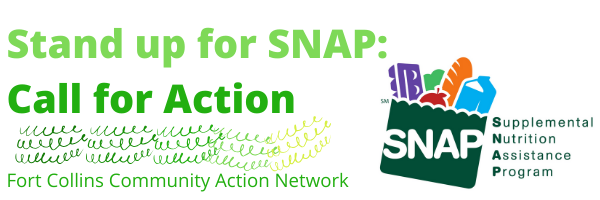This blog post first appeared on Hunger Free Colorado’s website, and was reposted here with their permission, find out more info here or email Anya@HungerFreeColorado.org.

Key points
The Proposed Standard Utility Allowance Rule Will:
- Exacerbate the struggle of affording both food and utilities for many low-income families
- Have harmful impacts on health and well-being and weaken Colorado’s economy
- Cause 40% of Colorado SNAP households to receive smaller SNAP monthly benefits
- Disproportionately impact older adults and people with disabilities
What can you do?
Submit a comment opposing the rule! The Trump Administration must review public comments on this proposal before it can finalize the rule changes. Speak out against the proposal by commenting before the December 2nd deadline. Click here or text HFC COMMENT to 52886 to submit your comment. You can use the key points from this blog to inform your statement!
What’s the proposal?
The U.S. Department of Agriculture (USDA) is proposing a rule to change how states take utility costs into account when determining the amount of SNAP benefits households qualify for. Under current federal SNAP rules, states have the flexibility to set the Standard Utility Allowance (SUA) and calculate shelter costs for low-income households. States have historically set their SUA to cover most SNAP household energy expenses during the months with the highest energy usage in the state or region. The proposed “one-size-fits-all” rule ignores the variance in utility costs between states and will force Colorado to lower the value of allowed utility expenditures to the limit set by the USDA, reducing already meager SNAP benefits for millions of households.
What’s the impact?
-Proposed Federal Budget slashes food stamps 30%, with a radical restructuring of the program that greatly reduces benefits for the overwhelming majority of receipts, grocers and retailers that provide access to food, jobs and economic health in communities. Will result in 4 million people losing benefits all together.
- proposed changes create unnecessary bureaucracy and infrastructure, a cost that could fall on Colorado
-Food stamps support families in building and maintaining a strong foundation for health and well-being. If such a proposal were enacted, the modest average food stamp benefit of $1.40 per meal would be further diminished. It would significantly impact the majority of those who are eligible for food stamps—children, seniors, veterans and people with disabilities.
- An increasing body of research demonstrates why food assistance is a smart investment that yields positive returns in the form of food and nutrition access, economic stability, health and well-being, employment, education, and productivity, which benefits all of us.
- Food stamps only make up a tiny portion—about 2%—of the annual federal budget.Cuts would not provide noticeable savings to taxpayers and, instead, negatively impact the health and well-being of Colorado residents and communities, as well as our state and nation’s economic health.
- To conclude, with deep cuts to food assistance, Medicaid, Medicare, affordable housing and community programs, the Trump Administration’s budget proposal endangers the well-being of our residents and economy. Moving forward with such a proposal would lead to an increase of hunger and poverty, with the ripple effects being felt by all communities in Colorado.